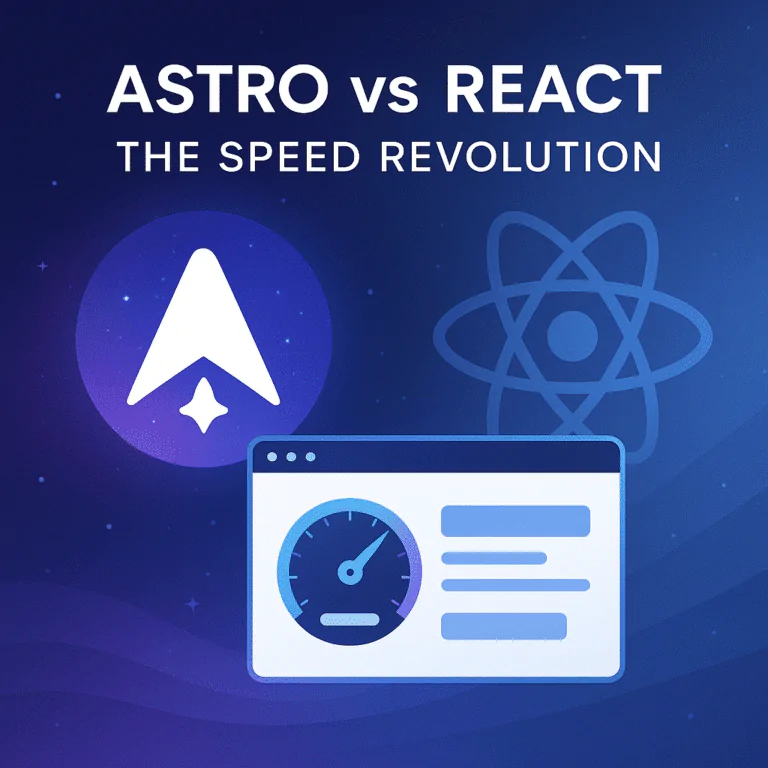
What Is Astro JS and Why It’s Replacing React for Fast Websites
Introduction
In the modern web development landscape, speed, SEO, and user experience are more critical than ever. For years, React has been the go-to JavaScript framework for building user interfaces. However, a newer contender, Astro JS, is rapidly gaining attention for its performance-first approach and developer-friendly architecture.
In this post, we’ll explore:
Need Fast Hosting? I Use Hostinger Business
This site runs on the Business Hosting Plan. It handles high traffic, includes NVMe storage, and makes my pages load instantly.
Get Up to 75% Off Hostinger →⚡ 30-Day Money-Back Guarantee
What Astro JS is
How it differs from React
Why it’s replacing React in many use cases
How Astro boosts site performance and SEO
Useful resources and FAQs
🚀 What Is Astro JS?
Astro is a modern static site generator (SSG) and web framework designed to build faster websites by delivering less JavaScript to the browser. Unlike traditional frameworks like React, Vue, or Angular, Astro uses a “zero-JS by default” philosophy.
Key Features of Astro JS:
Partial Hydration (aka “Islands Architecture”)
Built-in support for Markdown and MDX
Native support for multiple JavaScript frameworks (React, Vue, Svelte, Solid)
Excellent SEO performance out of the box
Server-side rendering (SSR) support
🔗 Learn more from the official site: https://astro.build
⚖️ Astro JS vs React: What’s the Difference?
| Features | Astro JS | React |
|---|---|---|
| Rendering Model | Static Site Generation (SSG), SSR | Client-Side Rendering (CSR), SSR |
| JavaScript Usage | Zero JS by default | JS-heavy applications |
| SEO Optimization | Excellent, thanks to HTML-first output | Requires tuning (e.g., with Next.js) |
| Performance | Lightning-fast load times | Can be slower due to larger JS bundles |
| Developer Experience | Framework-agnostic, easy setup | Requires bundlers and tooling setup |
| Use Case Fit | Blogs, documentation, marketing sites | Complex SPAs, dashboards |

🧠 Why Developers Are Switching to Astro
1. Speed That Dominates Core Web Vitals
Astro websites often achieve 100/100 on Google Lighthouse audits due to minimal JavaScript and optimized HTML rendering.
2. SEO-Friendly by Default
Astro outputs fully-rendered HTML at build time, making it ideal for search engine crawling and metadata optimization.
3. Component Flexibility
Use React, Svelte, Vue, or Solid components together in a single Astro project — without sacrificing performance.
4. Smaller Bundle Sizes
Because Astro only hydrates what’s needed, it avoids shipping unnecessary JavaScript to users.
🔗 Read how Astro compares to other tools: Astro vs. React vs. Next.js Performance Benchmark
Useful Links
- Forget Selenium: Building AI Agents with browser-use & DeepSeek (The New 2026 Standard)
- The End of Localhost? Why Cloud Dev Environments (CDEs) Are Taking Over
- Cybersecurity for AI Workloads: Protecting ML Pipelines in 2025 and Beyond
- AI-Native Grads vs. Traditional Developers: The Talent War CEOs Are Betting On
- Google’s New Ranking Factor Is Quietly Killing Small Developer Blogs (2025 Guide)
- 📛 What Developers Should Stop Doing in 2025 (And What to Do Instead)
🌐 Use Cases: When to Choose Astro Over React
Content-heavy websites (blogs, portfolios, documentation)
Sites where SEO is a priority (marketing pages, landing pages)
Projects requiring minimal interactivity
Teams looking for simple deployment and fast builds
🔧 Getting Started with Astro
To start an Astro project:
Follow the official getting started guide:
👉 Astro Docs – Getting Started
📚 Related Resources
❓ FAQ: Astro JS vs React
Q1: Is Astro JS better than React for all projects?
A: Not necessarily. Astro is ideal for static, content-rich websites. React is better for complex SPAs or dynamic applications.
Q2: Can I use React components in Astro?
A: Yes! Astro supports React, Vue, Svelte, Solid, and more — even within the same project.
Q3: Is Astro good for SEO?
A: Absolutely. Astro’s static HTML output makes it highly SEO-friendly, improving crawlability and page speed.
Q4: What’s the learning curve of Astro compared to React?
A: Astro has a gentler learning curve, especially for developers familiar with HTML, Markdown, or existing JS frameworks.
Q5: Can I deploy Astro sites easily?
A: Yes, Astro works with Netlify, Vercel, Cloudflare Pages, and static hosting services.
📈 Final Thoughts
Astro JS is not just another JavaScript framework — it’s a complete rethink of how modern websites should be built. If your goal is to build lightning-fast, SEO-optimized, and maintainable websites, Astro is worth the switch.
Whether you’re a freelancer, agency, or business owner, consider giving Astro a shot — you might not go back.

🚀 Let's Build Something Amazing Together
Hi, I'm Abdul Rehman Khan, founder of Dev Tech Insights & Dark Tech Insights. I specialize in turning ideas into fast, scalable, and modern web solutions. From startups to enterprises, I've helped teams launch products that grow.
- ⚡ Frontend Development (HTML, CSS, JavaScript)
- 📱 MVP Development (from idea to launch)
- 📱 Mobile & Web Apps (React, Next.js, Node.js)
- 📊 Streamlit Dashboards & AI Tools
- 🔍 SEO & Web Performance Optimization
- 🛠️ Custom WordPress & Plugin Development
One comment
Leave a Reply
You must be logged in to post a comment.








I’m amazed, I habe to admit. Seldom do I come across a blog that’s equally educative and entertaining,
and without a doubt, you have hit the nail on the head. The problem is
something that not enough folks are spezking intelligently about.
I’m very happy I came across this during mmy hunt for something concerning this. http://Boyarka-inform.com/